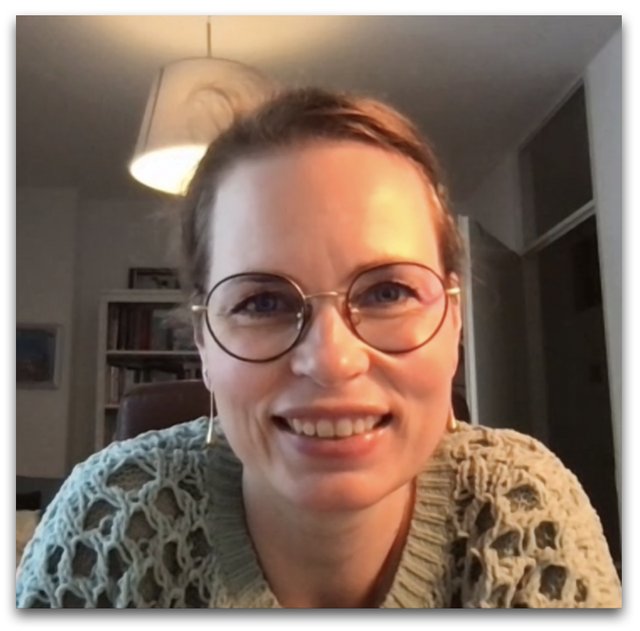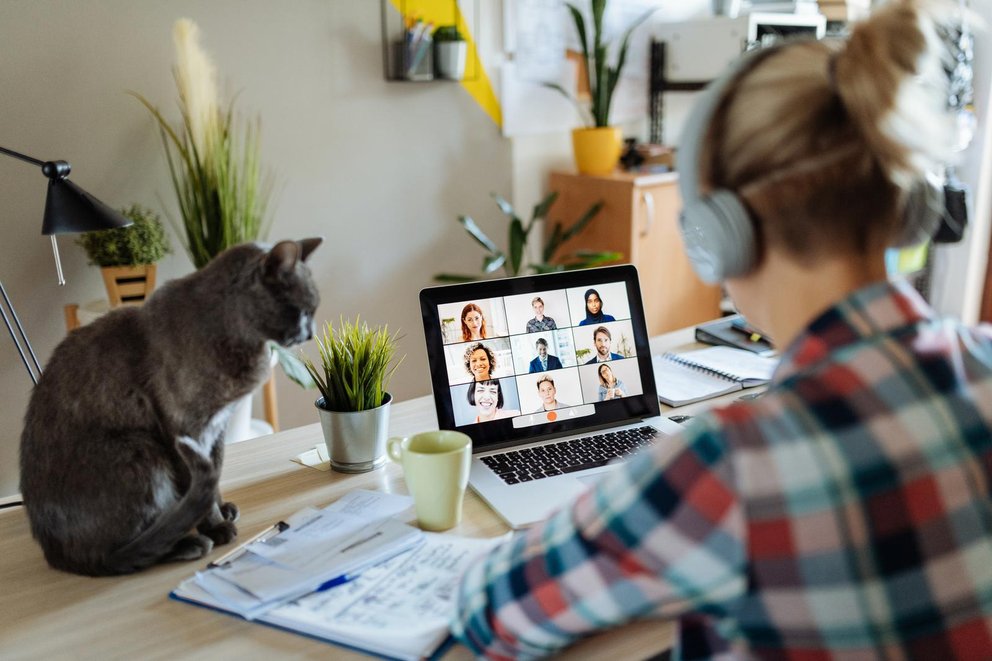In March 2020, the RIPE NCC moved from a vibrant office in the centre of Amsterdam to fully remote work in almost a split second. One year on, HR Director Carolien Vos talks about how we as an organisation have adapted in order to keep functioning during a global pandemic.
The RIPE NCC is internationally focused, having Europe, Central Asia, Russia, and the Middle East as our service region and connecting with other Regional Internet Registries globally. 
Since a year has passed, it’s time to reflect back a bit. As an organisation we can be proud of how quickly we adapted our work processes to the new situation. Our day-to-day work, training courses, conferences, service delivery, onboarding - so much of what we do has been successfully transformed into online activities and events. From a HR perspective, we've been working to make sure our staff can keep doing all the work they do in spite of the impact of the pandemic.
Working Our Way through COVID-19
As an organisation, we've been very fortunate. Our existence hasn't been put into jeopardy due to COVID. On the contrary, the Internet is one of the drivers for the global economy. I know I am not just speaking for myself when I say I am very proud to be part of that.
That said, the COVID situation has had an impact on all of us. Like so many, we’ve had to get used to full-time working from home, having our families around us 24/7, combining homeschooling and child care with work, adjusting to spending too much time by ourselves or long hours behind the computer, and everything else in between. We also have a lot of expat colleagues who’ve had to struggle separation from family members.
Taking Measures
Recognising these challenges, we took early measures to provide for the wellbeing of our staff:
- We introduced a "recharge your battery" programme aiming to motivate people to take proper breaks.
- We offer a monthly "recharge your battery day" to motivate staff to be away from the computer for a day and relax.
- We allocated a budget for setting up a proper home office and organised ergonomic workshops for staff.
- Each staff member receives a monthly compensation for working from home.
- We implemented a policy allowing expat staff the opportunity to work abroad for a few weeks so they can visit family within the travel boundaries and quarantine restrictions. This is highly appreciated.
Organising engagement activities is an ongoing challenge since it needs to be appealing enough after a long workday to attract staff for another online activity. Luckily, we have lots of creative colleagues in-house who come up with new ideas.
Wellbeing
Despite all the good efforts and intentions, extra attention on mental wellbeing is a must. Even though we're all in the same boat, we're all dealing with this in different ways. Talking and learning from each other is helpful, so recently we started up an open hour sessions where we share experiences with each other. It’s still in an early stage, but the first step is taken to open up about it.
Besides the extra activities we implemented and organised for staff to adjust to the new remote working situation, obviously, the normal HR activities continued.
Recruitment during COVID-19
What we noticed is that in the first six months there was some reluctance in hiring new staff. However, we did welcome eight new hires to the RIPE NCC. Some were recruited right before the lockdown, some during, but the common mentality was "let's wait until we can interview someone in person again" or "how on earth can we onboard and connect with someone remotely?".
This was understandable, especially since we focus on cultural diversity, and hiring someone from abroad during COVID has been a bumpy ride. Not necessarily the recruitment itself, but the whole relocation process afterward. Each process, from visa application to online social security applications and so on, takes longer. One time, an online application for a social security number took three months before it was delivered. But as we improved our processes ourselves, so did every agency we have to deal with in a relocation process. It's getting easier and with some ups and downs along the road, now we know what to expect. In that sense, I think COVID generally forced us - at high speed - to be more efficient and less dependent on old-fashioned paperwork. I sincerely hope that this experience will have a positive impact on the rules and regulations regarding global mobility, and that these rules will become more flexible and less complicated.
The funny thing is that since we realised that working from home will be the way to go for much longer, teams feel much more confident in the process of recruiting remotely. This is one of the reasons our number of vacancies went up recently. It’s a very positive sign that our adaptation to the new situation is really kicking in. And yes, starting somewhere new and only being able to meet colleagues via a screen, is a weird way to start a new job. But with our online onboarding programme we try to smoothen this as much as possible in a welcoming way.
Personally, I hope that fully working remotely for an indefinite time will not be the end result of this. I very much look forward to having the informal catch up moments at the coffee corner again, the Wednesday lunches in the canteen, or those “randomly running into each other at the bike shed” moments.
Remote Interactions
This is a nice bridge to another challenge I observed - the switch from informal social interaction to formal social interactions. Back in the office, the informal interaction was just a very nice extra when going to work. In the current situation, we’re in our homes, working in work rooms if we have them, or at kitchen tables, or even in bed with our laptops. What were once informal moments have to be scheduled, which makes them formal. The need to plan kills spontaneity. We do organise social events via Zoom or SpatialChat, which are very much appreciated, but it will never replace the real thing.
A challenge here is the diversity of needs. The diversity of characters and personalities is always an interesting topic in choosing your approach and leadership style, but these characters and personalities now come with an extra dimension, a diversity of personal situations. This requires for both leaders and HR to step up their game and invest time in personal attention and coaching leadership more than ever. Even when this personal interaction needs to be scheduled.
At the same time, remote working requires a higher level of self-management, self-motivation, self-awareness, and ability to self-assess on the side of the employee. Creating a high level of trust amongst each other, where everyone in your team feels confident in being transparent in what goes well, what needs improvement, and what goes wrong, is really important under these circumstances. You don’t want to end up in an online micromanagement atmosphere. And of course, don’t forget to celebrate the successes together and compliment each other on our achievements!
Driving Change
Driving internal change projects while everything in the world around us is changing can be tough. Personally, this has been an enormous learning experience for me, where I had to reinvent both myself and the overall approach of a project as well. My personal style has always been to try to find the right balance between the content and knowledge-driven approach versus the personal connection and building relationships approach. This hasn’t always been easy in a remote setting. Far more important now are topics like meeting structure, clear written introductions beforehand, presentations during meetings and the necessity to not overdo it with hours of meetings behind a screen. Constantly informing and engaging, keeping each other up-to-date and never assume, but always checking and writing minutes of what is discussed and agreed. Communication in writing is becoming more important. Every little question goes via written text, instead of quickly passing by someone’s desk. This may seem insignificant, but in practice, it makes a real difference.
Of course, connecting and building relationships is still a key part of the day-to-day work, but it’s definitely different than when we were all able to see each other in the office and sense the vibe of what is really going on.
Last but not least, looking back at last year I am very proud of what the RIPE NCC has achieved and how we have adapted to this situation. Each and every colleague has contributed to this in their own individual way and in their own capacity. Especially, how colleagues come with new, creative ideas to do their online work and how to socially interact with each other. It was definitely a year with ups and downs, but also a year with a lot of creativity, passion and dedication for our organisational mission, working together to shape the future of the Internet!
How are You?
As mentioned above, the pandemic continues to challenge mental wellbeing. In response to this, and to help people in the community, earlier this year a group of people from across the RIPE community launched an initiative to create awareness around this topic. Their goal is to help people in the community share experiences from the past year and talk about how they've been dealing with work and life under the present circumstances.
In the near future you will hear more of this initiative and we will ask you for input to make sure the chosen approach fits with your needs.



Comments 0
The comments section is closed for articles published more than a year ago. If you'd like to inform us of any issues, please contact us.